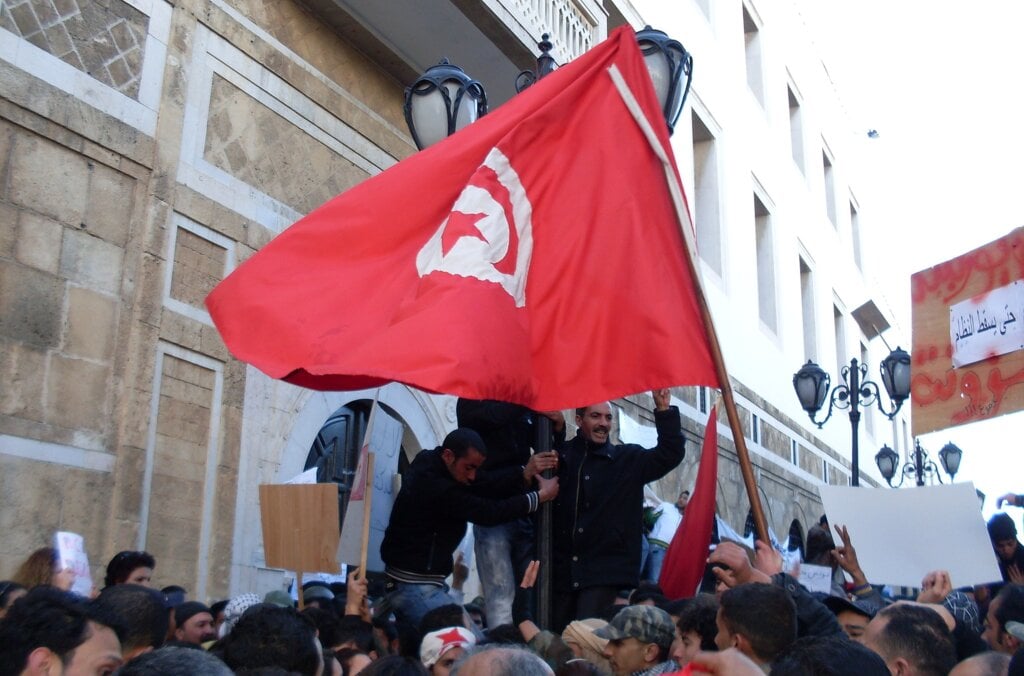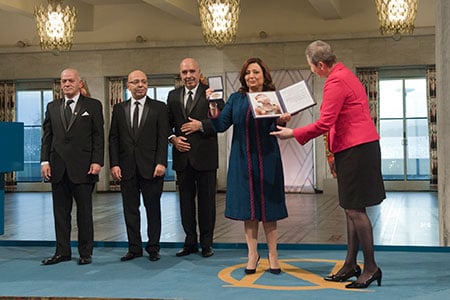National Dialogue Quartet
Speed read
The National Dialogue Quartet was awarded the Nobel Peace Prize for its decisive contribution to the building of a pluralistic democracy in Tunisia in the wake of the Jasmine Revolution of 2011.

Full name: National Dialogue Quartet
Native name: National Dialogue Quartet
Date awarded: 9 October 2015
From revolution to democracy
After the Jasmine Revolution of January 2011, the Tunisian people were filled with hope and expectation. A new constitution would give a new democratic future, and elections for a constitutional assembly were held in October 2011. But political antagonisms caused problems, and efforts to agree on a constitution became deadlocked in 2013. The conflict divided the population between supporters of the Islamist-dominated government and those who wanted the country to remain secular. Four non-governmental organisations formed a quartet for national dialogue, and undertook to mediate between the government and the opposition. Despite numerous crises along the way, the negotiations led to a successful outcome and helped Tunisia transition to a democratic political system in just a few years.
"This is a great joy and pride for Tunisia, but also a hope for the Arab World. It’s a message that dialogue can lead us on the right path. This prize is a message for our region to put down arms and sit and talk at the negotiation table."
- Houcine Abassi, Secretary General of UGTT, 9 October 2015, to Reuters.
| The Jasmine Revolution Term used for the 2011 Tunisian Revolution. It started in central Tunisia, a region suffering from severe social and economic deprivation. Local demonstrations calling for political change turned into a nationwide revolt, which went on to inspire protesters in several other countries in what is also known as the Arab Spring. Social media were used as important means of spreading the message and mobilising activists. |
| Democracy Greek for government by the people. A form of government in which all adult citizens participate in the governing of the state and everyone is equal under the law. Most democracies are representative governments. Individuals are elected to assemblies that take decisions on behalf of all citizens. |

A year that changed Tunisia
The Jasmine Revolution took place in January 2011 after a month of popular protest. For a long time the demonstrations were dominated by young people mainly demanding work. Important professional groups, like lawyers and doctors, gradually joined the revolt. After 23 years in power, President Ben Ali fled the country on 14 January. The revolution had succeeded. A period of political trial and error followed, with several provisional governments. Despite the major challenges, the country succeeded in holding its first democratic elections on 23 October 2011.
A quartet of organisations
The human rights organisation LTDH (1976) is the first of its kind in Africa and the Arab world. Like the LTDH, the labour union UGTT (1946) was fiercely suppressed by President Ben Ali, but played an important role during and after the revolution. The employers’ organisation UTICA (1947) represents over 150,000 private companies. The national association of lawyers ONAT (1887) has fought for citizens’ rights under several authoritarian regimes. In January 2011, striking lawyers played an important role in the course of the revolution.

Copyright © The Nobel Foundation 2015. Photo: Ken Opprann
New constitution for a democratic Tunisia
The Tunisian National Dialogue Quartet played an important role in framing the country’s new constitution, which was adopted in January 2014. The Constitution continues Tunisia’s post-colonial status as a modern secular state, but now with democracy at its core. 28 of its articles aim to protect citizens’ rights, legal safeguards and religious freedom. For the first time in an Arabic country, the Constitution has a separate article guaranteeing women’s rights and safeguarding gender equality in popularly elected assemblies. Tunisia’s new Constitution prompted international acclaim.
From the Nobel Commitee’s announcement
“The Nobel Peace Prize for 2015 is to be awarded to the Tunisian National Dialogue Quartet for its decisive contribution to the building of a pluralistic democracy in Tunisia in the wake of the Jasmine Revolution of 2011. (…) It established an alternative, peaceful political process at a time when the country was on the brink of civil war. It was thus instrumental in enabling Tunisia, in the space of a few years, to establish a constitutional system of government guaranteeing fundamental rights for the entire population, irrespective of gender, political conviction or religious belief.”
Learn more
In 2011, Tunisia was experiencing a revolution. In its wake, the stability and security of the country were considerably compromised. After the creation of the Assemblée nationale constituante (Constituent Assembly of Tunisia) of 2011, the writing of a new constitution proved difficult and the one-year deadline for its final ratification passed without much progress ...
Disclaimer: Every effort has been made by the publisher to credit organisations and individuals with regard to the supply of photographs. Please notify the publishers regarding corrections.
Nobel Prizes and laureates
Six prizes were awarded for achievements that have conferred the greatest benefit to humankind. The 14 laureates' work and discoveries range from quantum tunnelling to promoting democratic rights.
See them all presented here.
